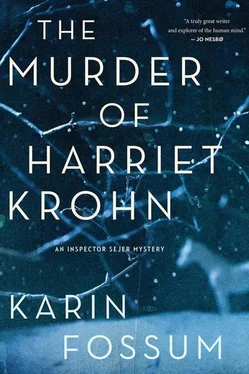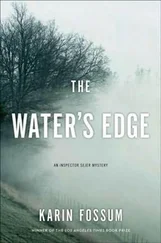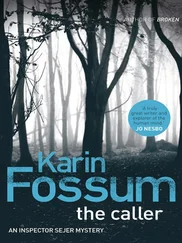Sejer leans back. He stretches his long body, looking comfortable and relaxed.
Charlo can’t help himself. “How did you know I was involved?”
Sejer keeps silent and just looks at him with those gray eyes. He ignores the question. Charlo has the sneaking feeling that he’s lost control already. He has no authority in here; he’s just some poor sod. The man on the other side of the desk has the upper hand in everything.
“This junction,” Sejer says, “let’s take a close look at it.” He gets up and rummages among some documents on a shelf, and returns with a map. Charlo can see that markings have been made on it with a felt-tip pen.
“D’you recognize this junction?”
He pushes the map over to him. Charlo studies the roads and the arrows.
“Yes, just about,” he says. He doesn’t want to go back there. The thought of it is repellent.
“There’s the railway station,” Sejer says, pointing. “Can you show me where you came from?”
“It’s difficult to remember after all this time.”
“I understand.” He nods, understanding and patient. “But it’s important to us that you try.”
This is like banging his head on a brick wall. He’s captive in here. He’s got to answer. Could he ask for a lawyer? No, that’s ridiculous. He hasn’t been charged with anything. He’s just a witness.
“It’s possible I came from over here,” he says, and points. He doesn’t dare lie about it. The truth, he thinks, for as long as possible.
Sejer looks at the map.
“Fredboesgate,” he says distinctly, and looks up. “You came from Fredboesgate?”
Charlo nods. Panic seizes him because everything’s moving so quickly. He’s already placed himself in the vicinity of Harriet’s house.
“Yes,” he says, and nods submissively. He doesn’t look at Sejer, but studies the map with feigned interest.
“And the other car?”
“It was a Toyota,” Charlo says. “A Yaris, I think. He came from here.”
He points and notices that the street is called Holtegate. Satisfied, Sejer nods.
“Could it have been the seventh of November?”
Charlo leans across the desk, trying to gain the initiative. Again he looks at the dog resting by the wall. He doesn’t move. Like a toy animal that a child has slung there.
“It could quite possibly have been in November,” he says, “but I can’t be more precise than that. I was unemployed then,” he adds, and gets carried away in a stream of words. He can’t stop himself. “And the days just became a blur. I couldn’t tell them apart — that’s why I can’t be sure of dates. Now I’ve found work at the riding center,” he adds, “not full-time work, but it helps. I can be useful, do something with my hands, and suchlike. I’ve told Social Security, too, so they cut my unemployment benefits accordingly. I’m an honest man,” he concludes, with a defiant look at the inspector.
Sejer remains silent after this tirade. Charlo senses the redness of his cheeks. He regains control of himself. He’ll just answer questions. That’s all. No more going off like that. But there’s a pressure inside him, a defense. He didn’t want that, didn’t mean it. He was just a prisoner of the situation and his own fear. Of his own desperate need.
“But it could have been the seventh?” Sejer repeats.
Charlo shrugs. “Quite possibly. Well,” he says getting exasperated, “I suppose it was the teenager in the Toyota who led you to me. I don’t know if he took my registration number or what, but if he says it was the seventh, then it must have been!”
He regrets his outburst immediately.
“It was the seventh,” Sejer remarks quietly.
He makes notes on his paper again. Then he folds his hands on the desk. Charlo’s blood runs cold. He can’t see any end to this. This is the start, he thinks. Of the nightmare. They’ve picked me out from the crowd. He has no idea how they managed it.
“Yes, he got part of your registration number. Have you any thoughts about why he might have done that?”
Charlo is mute. He looks at the dog again; he likes watching the sleeping animal.
“No,” he says with a shrug. Sejer leans across the desk, suddenly very close.
“Didn’t you get rather worked up about this collision?”
His voice has assumed a note of sympathy. Charlo rubs his chin.
“Yes, I got worked up. I assume you’ve been given a full account. I lost my temper. I thought he was driving like an idiot, and I probably got quite angry. Almost anyone would have, in my shoes. But what did he actually say? Did he feel threatened? I never threatened him, but I did totally lose my cool. My life wasn’t easy just then,” he admits, with a touch of self-pity. “I was probably on a bit of a short fuse. That’s only human. It’s not a crime.”
The word pops out his mouth. He leans back, wanting to take control of the conversation. But it won’t be controlled.
“Your life wasn’t easy,” Sejer says. “Can you elaborate a little?”
“I don’t quite see what my life has got to do with this,” he replies quickly. “You say I’m only a witness. You keep going on about this collision and things. What is it you really want?”
Sejer picks up his pen again. Holds it between his fingers.
“I can understand that you don’t see the point. But there is a point.”
Charlo hesitates. He doesn’t dare argue. The chances of letting something slip are greater then, so it’s best to cooperate. He sees that the truth would be best.
“I’ve already told you,” he says. “I was unemployed. No work to go to. Short of money. Things like that. It’s soul-destroying not having a job. You lose all your self-esteem. Dignity, self-respect. You avoid people and can’t be bothered to answer questions. The days are a living hell, and you don’t sleep at night and then stay in bed late. Just making food is a chore. You feel like you’ve fallen off a merry-go-round, and you’re standing there watching the others who’re still on it. It’s like being a spectator of life.”
“But things are better now? That’s right, isn’t it?”
Charlo nods silently. Compresses his lips.
Sejer drinks some Farris.
“Let’s take it from the beginning,” he says. “You were driving out of Fredboesgate.” As he says the word “Fredboesgate,” he looks up at Charlo. “You approached the junction. The weather was bad on the seventh of November, sleeting and very slippery.”
“That’s right.”
“What time of night was this?”
“Well, it was about ten. Or maybe half past, possibly, I’m not quite sure.”
“Did you see the car coming?”
“Yes. But I was immersed in my own thoughts. I was sure he’d seen the sign telling him to give way. Of course he braked, but the car skidded straight on in those road conditions. A Toyota Yaris, I ask you. Without winter tires. People shouldn’t be allowed to drive that sort of car in winter weather. Shouldn’t be allowed to drive them at all. They’re just sardine tins on wheels.”
“So,” Sejer says. “There was a crash. Then what did you do?”
“I remained at the wheel for a little while, dazed. I looked into the other car and there was a teenager. He seemed terrified.”
“Go on,” Sejer says.
“I opened my door and got out. Yanked open his door and began yelling. It was all extremely childish, but I couldn’t stop myself.”
“How did the young man respond?”
“I expect you’ve asked him about that,” says Charlo, wanting to retreat again. He’d like to go home. He doesn’t think he’s doing very well. Not at all, he’s doing brilliantly. He’s telling the truth, and that’s easy. Up to a certain point.
“Yes, but I need your take on it, you know?”
Читать дальше












